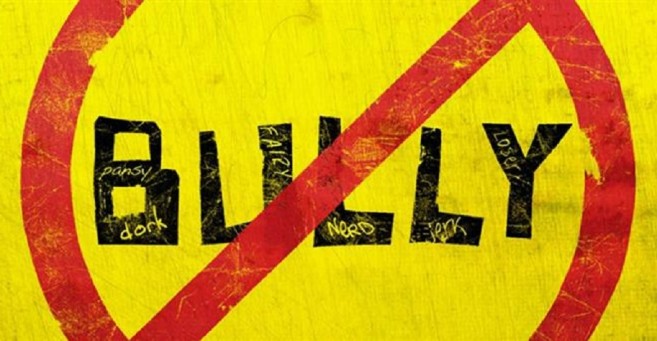It’s On: The Battle Over the Bully Rating Heads to Washington, DC
Officially Official

The public outcry over the harsh R rating for the documentary Bully has hit a new level and headed straight to the Washington, D.C., headquarters of the people who granted that rating, the Motion Picture Association of America. In an attempt to quell criticism over the rating — which prevents the people who need to see this movie from seeing without adult supervision — the MPAA held a screening and panel discussion to try to convince the highly-influential guests who were invited (including Congressional Representatives) why the R rating was sound. The opposite happened, and now the MPAA is under fire on its own turf.
In case this is the first you’re hearing of the Weinstein Company‘s Bully and its rating fight with the MPAA, the filmmakers organization — which was, ironically, formed by filmmakers to fight against censorship (by the government) — has given this documentary about teenage students who deal with bullies an R rating, meaning that most teenagers (who might be dealing with similar problems) will not be able to see this movie unless they’re supervised by an adult. Since most teenagers like to do things without their parents, especially when it comes to serious, personal topics like bullying, this means that a lot of the people who should and would want to see Bully won’t be able to see it. Why is it rated R? Sexual content? Graphic violence? Nope, neither. Cursing. It’s rated R for cursing. You know, because we wouldn’t want our kids exposed to cursing, because they never do that!
And while this story has been covered in the news and has prompted tons of online activism (including a petition started by a bullied teenage girl from Michigan that now has over 300,000 signatures), fueled by the Weinstein Company, only now has it gotten as far as the MPAA directly addressing the issue at its official headquarters, signaling that they have heard what everyone has been saying and want to have a discussion. Even though they still believe they were right in their decision, at least they are now actively debating the issue at the highest level rather than just ignoring it and stubbornly standing their ground.
But what they thought would be their closing argument turned out to further fan the flames of controversy. The screening and panel featured the movie’s director, Lee Hirsch, distributor, and one of the subjects, Kelby Johnson, who asked those in attendance, “Since when did curse words become more important than children’s lives?”
The MPAA chief, former Sen. Christopher Dodd (a name you might remember from the SOPA/PIPA debacle), has been trying to defend the rating by saying that if he goes ahead and makes an exception for Bully, then there will be “10 other filmmakers lined up” asking for lighter ratings. That refers to how the MPAA grants its ratings: the organization doesn’t consider the context or the themes. It just has a set of criteria. In this case, using the a profanity like “fuck” more than once automatically gives the movie an R rating. Using it only once will allow a PG-13 rating. Obviously, since Bully takes place in a real school setting, the word “fuck” shows up more than once, notably in one scene that features a bully spewing a tirade of profanity at one of the film’s subjects.
Dodd has said that if that scene is edited down, then the rating will be amended. However, it’s that scene that the filmmakers say is one of the most illustrative scenes in the whole movie, and editing it down will take away from the message they’re trying to convey. Harvey Weinstein has said that he’d move forward with an unrated release if they can’t get the PG-13 rating, though that makes some theater chains unwilling to release it. One exception is AMC Theaters, which has said they would release this particular unrated movie (which teens could see unsupervised), and more chains could possibly follow suit.
David Long, the father of one bullying victim featured in the movie, Tyler Long, who hanged himself after being bullied repeatedly, said that he just doesn’t see the point of the cursing criteria:
“If it can be said once, what’s the difference between one and six? I mean, [the obscenity] is already out there.”
But what is consistently pointed out is the irony of it all — a movie that is intended to inform kids and teens about bullying is being kept from kids and teens by an organization that exists to fight censorship. Dodd himself said that he doesn’t want to disturb the integrity of the film by making the filmmakers change what they made, saying, “I don’t want [the ratings issue] to step all over what Lee crafted.” To which Hirsch countered, “The R is stepping over it, and that’s the problem.”
This is a great moment for us, because we rarely get to mention the ouroboros in posts. And now we can.
We’ll end on this: Bully comes out March 30. It is currently rated R, for language. The Hunger Games, a movie that is about teenagers literally killing each other as instructed by their government, comes out March 23 and is rated PG-13. Well, at least they don’t curse!
(via 24 Frames)
- MPAA Stands Firm on Rating for Bully, Weinstein Company Considering “Leave of Absence”
- MPAA Rates Documentary About Anti-Childhood Bullying Movement Too Severely For Children to Actually See It
Have a tip we should know? tips@themarysue.com